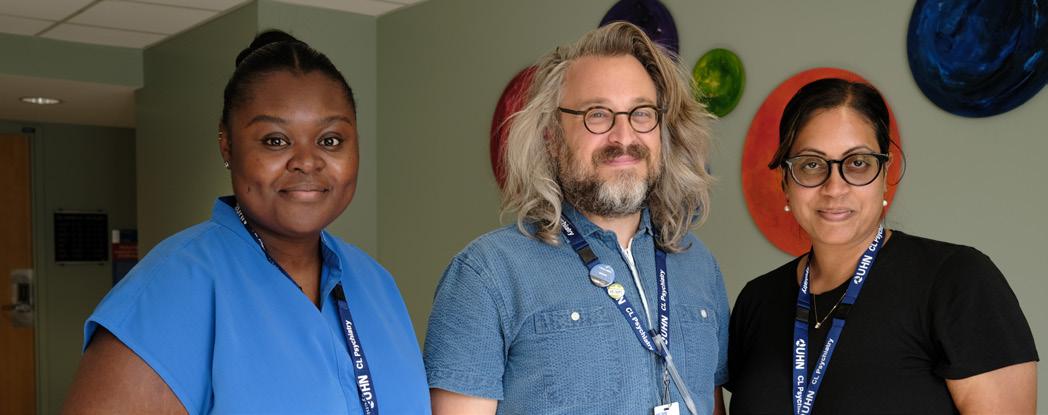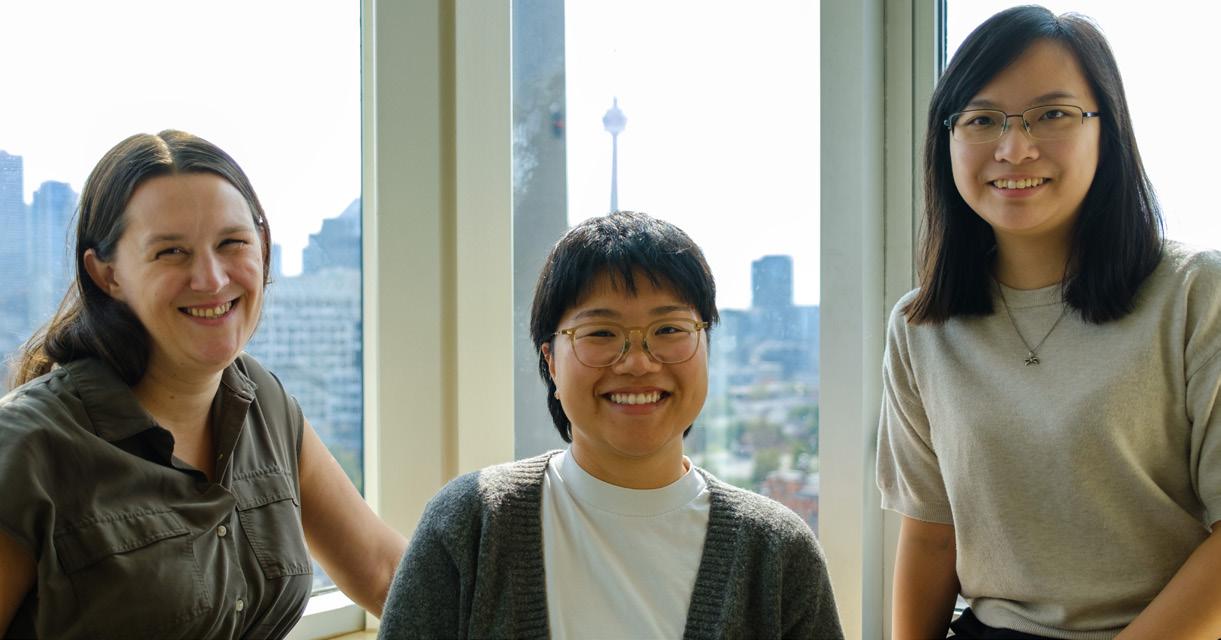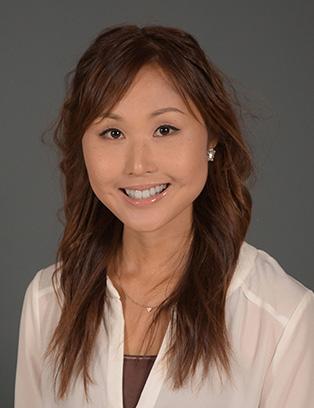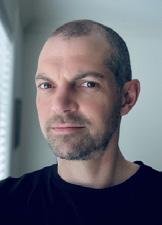




is home to Canada’s largest medical psychiatry team serving some of the country’s most complex patients who suffer from comorbid physical and mental illnesses. We are one of Canada’s largest mental health research hospitals. We are in a unique position to drive the integration of physical and mental health care forward in partnership with patients, caregivers and care providers.
We acknowledge that the land on which we work is the traditional territory of many nations, including the Mississaugas of the Credit, the Anishnabeg, the Chippewa, the Haudenosaunee and the Wendat peoples, and is now home to many diverse First Nations, Inuit and Métis. We also acknowledge that Toronto is covered by Treaty 13 with the Mississaugas of the Credit. We remember and honour the legacy of the peoples who have been here before us and all who strive to make the promise and the challenge of Truth and Reconciliation real.
The Centre for Mental Health is committed to championing inclusion, diversity, equality, equity and accessibility in the learning, work and service environments. We believe that our differences enrich our ability to develop creative and innovative approaches to delivering exemplary patient care, research and education.
Front Cover. Staff members from the Centre for Mental Health’s Acute Care and General Psychiatry division, including Christopher Braz (RN), Michelle Buda (RN), Greg Baker (RN), Cheryl Peters (Manager, Professional Practice), Aideen Carroll (Advance Practice Nurse Educator; RN, BScN, CPMHN(C)), Maryam Mohamed (RN), Ronald Rush (PSW), Vesna Manevska (RN) and Cindy Lu (RN).
The Centre for Mental Health stands at a critical juncture. Five years ago, we developed an ambitious strategic plan to transform how we deliver care, outlining the first steps towards fully integrating physical and mental health across all programs at the University Health Network (UHN). This plan builds on one of our core strengths — addressing complex, co-occurring medical and mental health needs — which has guided recent initiatives, helping us rethink our approach to mental health care and cementing UHN’s position as a leader in this field.
Throughout this report, you will read
to the support they need. Additionally, through a partnership with Baycrest, we now offer rapid access consultations to support patients in long-term care facilities (pg. 21).
Our commitment to excellence extends beyond treatment innovations. We’ve strengthened our services by cultivating a strong, sustainable program and culture. This is exemplified by the exceptional work of our acute care mental health nursing team (pg. 10), whose expertise and compassion form the backbone of our service. Our psychologists are also instrumental in supporting Ontario’s largest adult eating disorders program (pg. 13), delivering specialized care that profoundly impacts patients’ lives.
These accomplishments reflect significant progress made under the 2019-2023 strategy, a roadmap that has guided our efforts.
As we look to the future, we are excited to deepen our collaboration with the Centre for Addiction and Mental Health (CAMH).
With UHN and CAMH having both renew-

ed their strategic visions for the future of health and healthcare, now is a unique opportunity for Canada’s #1 hospital research network and Canada’s largest specialty mental health hospital to deepen our partnership and achieve more together than we could individually.
Our growing partnership with CAMH will prioritize the continued integration of physical and mental health care and advancements in brain health science. We are already laying the groundwork for joint initiatives, developing care pathways for patients with addictions and medical comorbidities (pg. 22).


Dr. Susan Abbey Psychiatrist-in-Chief & Program Medical Director Centre for Mental Health, UHN

Ms. Marnie Escaf Vice President, Clinical UHN

93,083 Outpatient Visits
57 Inpatient Beds
81 Nurses Clinical Care People
9,405 Emergency Visits 83% Virtual Visits
15,721 Inpatient Days

109 Physicians
167 Health Professions Staff
31 days Avg. Inpatient Stay
58 Additional Staff



We are composed of 6 divisions, each containing a number of specialized clinics and services that provide support to a complex and diverse range of patients.
Delivering critical psychiatric care to patients experiencing a crisis and requiring urgent intervention.
Providing intensive, personalized treatment to patients as well as information, resources, and support to Canadians affected by these illnesses.
Providing mental health support across UHN to patients with complex medical and surgical illnesses in areas like oncology, cardiology and transplant.
Supporting patients with a wide-range of services including substance use disorder treatment and culturally competent care.
Advancing multiple treatment types to provide integrated, wrap-around care in the treatment of mood disorders.
Supporting patient care, research and education for older adults living with mental health issues such as cognitive impairment and mood disorders.
The Centre for Mental Health is UHN’s 12th clinical program, reflecting the hospital’s strategic goal to integrate physical and mental health organization-wide.
As a team of 200+ health professionals and 100+ psychiatrists spread across four hospital sites, the program is organized within a division structure (as outlined on the preceding page). Each division is coled by medical and operations leads who conduct regular business meetings.





This collaborative approach enables health care teams to merge clinical insights with operational data, aligning goals and strategies. It supports a holistic model of healthcare management that strengthens the program’s success in efficiently delivering high-quality care.
Continued refinements to the program’s structure position the Centre for Mental Health to adapt, evolve and focus on interprofessional clinical care, research and education.









Canada celebrated the first National Mental Health Nursing Day on February 21, 2024. The Centre for Mental Health team celebrated the occasion and reflected on this long awaited acknowledgment of mental health nursing as a specialty.
Mental health nurses address the intricate connection between mind and body, ensuring that patients with both mental and physical comorbidities receive integrated care. “Mental health and psychiatry literally permeate every aspect of medicine,” says Greg Baker, Registered Nurse (RN) with the 8ES Mental Health Inpatient Unit at Toronto General Hospital. The holistic approach recognizes how crucial mental well-being is to overall health.
Therapeutic communication is a central
skill. It involves building a supportive rapport that helps patients feel understood and valued. “It’s hard for them to trust how they will benefit from mental health treatment as it is not a quick and visible process,” says Vesna Manevska, RN with the 8ES Unit, highlighting the unique challenges and rewards of guiding patients through tough times.
After starting his career in vascular surgery, Christopher Braz transitioned to the Psychiatric Emergency Services Unit (PESU) at Toronto Western Hospital, where he has been a mental health nurse for 8 years. “It’s about making sure patients get the care they deserve and addressing issues before they escalate,” says Braz, reflecting on the proactive approach that mental health requires.

Listening and compassion are vital skills in this field. “Giving patients the time and the space to just tell their story their way and to tell their truth” is essential, says Ronald Rush, a Personal Support Worker with PESU. Ms. Manevska adds that it’s also about hearing “the words they don’t say,” identifying unspoken needs and gaps in patients’ lives.
Despite the rewards, the field faces challenges, including misconceptions and stigma both within the healthcare system and society at large. Mr. Baker recalls nursing colleagues who viewed mental health as dangerous and less legitimate, but he counters “Safety is a number one priority in a mental health unit.”
Teamwork and interdisciplinary collabo-
ration are crucial. Cindy Lu, an RN with PESU, describes the collaborative environment where nurses, psychiatrists, and other healthcare professionals work closely to provide comprehensive care. “We work together. We ask each other about our opinions,” she says, illustrating the team-oriented approach that enhances patient outcomes.
Certification in mental health nursing is available through the Canadian Nurses Association, and any nurse interested in mental health can enroll in a 10-week program at the Michener Institute for Education at UHN, led by Advance Practice Nurse Educator Aideen Carroll, who notes, “mental health nursing is the art and science of nursing, combining both mental and physical assessment.”
Implementing a Lean Program Management approach to UHN’s Eating Disorders program has been essential in managing patient referrals, streamlining the assessment process and ensuring spots in both the inpatient and outpatient streams are fully utilized. The Lean approach focuses on reducing inefficiencies by optimizing scheduling, minimizing wait times, and eliminating duplicate work.
The team’s first project was a dashboard that captured important metrics around program capacity. Built by UHN’s Data & Analytics, it launched in the summer 2023 and contributed to improved wait times by reducing the number of patients waiting for assessment.
“We wanted a single place where we could easily view patient data — the number of
patients with pending assessments, the number of days patients are on the wait list — without conducting extensive data analyses each time,” says Annie Fernandes, Operations Lead.
A subsequent project involved a Lean engineer collaborating with clinical and administrative staff to analyze the intake process and identify bottlenecks. This led to redesigned workflows that enhanced team communication and provided a more seamless patient experience.
“The Lean initiative highlights the importance and value of everyone’s role in the process, both on the admin side and in clinical practice,” says Ms. Fernandes. “It’s given us the tools to continue improving our program processes.”


UHN’s Eating Disorders program is one of the few areas within the Centre for Mental Health that includes psychologists directly on the team, playing a pivotal role in patient care.
This includes Dr. Shauna Solomon Krakus, who started at UHN in 2018 as a practicum student and is now a psychologist specializing in eating disorders.
“Growing up, I noticed a real need in this area and I was seeing it among my peers,” she says. “It was something I felt needed more attention and support, and I wanted to help fill that gap.”
As part of the program’s Virtual Intensive Outpatient Service, she conducts initial patient assessments and provides individual and group therapy sessions
focused on modifying behaviors through Cognitive Behavioral Therapy and body image work. Collaboration is key in this multidisciplinary program, involving psychiatrists, dietitians, nurse practitioners and social workers.
Despite the challenges — a lack of a onesize-fits-all treatment, societal influences like diet culture — Dr. Solomon Krakus finds her work incredibly rewarding.
“Seeing patients critically evaluate and challenge problematic ways of thinking that are perpetuated in our society is the most fulfilling part of my job,” she says. “It’s like a light bulb goes off, and you know you’re making a difference.”
“I’m really proud of the psychologist lens we bring to the team.”

A new partnership with Youth Wellness Hubs Ontario (YWHO) aims to address a crucial gap in care by supporting Transitional Age Youth (TAY) — individuals aged 18 to 25 — with their unique mental and physical health needs.
Transitioning from adolescence to adulthood is challenging, marked by psychological, physical, and social changes. Young people, especially those with chronic illnesses, disabilities, or mental health conditions, often struggle to integrate their health needs into their life plans and face challenges accessing integrated care, as health services tend to be siloed between adults and youth, and between physical and mental health.
“At UHN, we see many patients navigating this pivotal phase of life,” says Dr. Susan Abbey, Program Medical Director, Centre
for Mental Health. “This partnership will implement a systems-level approach to ensure this group receives the comprehensive support it deserves, and that no one loses access to treatment during their transition to adult services.”
Tailored care pathways will link UHN and YWHO, focused on TAY who meet UHN’s Mental Health in Medicine (MHiM) Clinic eligibility. The MHiM Clinic will support their mental health needs within the hospital and assist other UHN clinics lacking resources for this demographic. YWHO’s 31 low barrier, youth-friendly locations, will provide high-quality services for patients as they transition back into the community.
With an expected 2025 launch, this collaboration is possible thanks to the Slaight Family Foundation’s $1.5M donation.
Chronic pain and its intersection with mental health present significant challenges for individuals, families and healthcare providers. Nearly 8 million Canadians live with chronic pain, and the co-occurrence of mental illness is extremely high, leading to complex patient needs and underscoring the urgent need for comprehensive and coordinated care.
People experiencing chronic pain face a spectrum of physical, emotional and social hurdles. These patients have significantly shortened life expectancies and are at risk of developing other ailments like diabetes, heart disease and problematic substance use.
“Many of these patients feel stigmatized
walking through our hospital doors, where their pain and symptoms may be undertreated,” says Dr. Jeffrey Wieskopf, a psychiatrist with UHN’s Centre for Mental Health and Toronto General Hospital’s Transitional Pain Service (TPS).
Dr. Wieskopf treats patients with severe mental illness and chronic pain. He is also involved in several research projects aimed at optimizing care and removing barriers to access, ensuring comprehensive support for these patients.
“The thing I love most about my job is helping improve my patients’ function and quality of life,” says Dr. Wieskopf. “When I can help a patient return to work or see them reconnect with friends and regain a sense of normalcy, it’s a huge win.”

In January 2024, UHN’s Centre for Mental Health launched the Central Referral Intake initiative to improve overall patient care and efficiency. Now, patients can be referred to one of 16 CMH outpatient clinics and services using one, standard referral form. The new system helps to facilitate better resource allocation and coordination among clinics, as well as reduce patient wait times.
“Our goal is to optimize how referrals are managed, ensuring patients receive timely and appropriate care.”
– Alison Seto Operations Lead
The initiative has already demonstrated success. Early data indicates that declined referrals dropped from 23% in 2023 to 18% in 2024, indicating improved efficiency in directing patients to appropriate care. Additional accomplishments include streamlining the referral process, ensuring consistent data collection and standardizing workflows in alignment with updated CPSO (College of Physician and Surgeons of Ontario) guidelines.
Looking ahead, ongoing collaboration with internal and external providers continues to refine the referral process. Plans also include creating a comprehensive referral monitoring dashboard, underscoring UHN’s commitment to improving accessibility and efficiency in patient care delivery.


The Centre for Mental Health is set to introduce an innovative eConsult pilot project in summer 2024. This initiative aims to provide patients and healthcare providers access to UHN’s psychiatric expertise through the Ontario eConsult Service, which offers a direct pathway to care, bypassing traditional referral delays.
Family physicians and nurse practitioners can quickly access specialist advice via a secure web-based portal, with responses provided within a week. This approach ensures timely support and facilitates seamless care transitions for discharged patients returning to community-based care, reducing the need for repeated referrals and alleviating patient concerns about accessing psychiatric support.
“Our vision is to increase and promote accessibility to our team of experts,” says Dr. Michael Armanyous, Medical Lead, Outpatient Mental Health. “This pilot project is a step towards achieving that goal and improving the overall patient experience.”
Anticipated eConsult queries will address medication adjustments, side effects and treatment recommendations, supporting primary care providers in managing complex mental health cases effectively.
This project represents a meaningful step forward in improving mental health care delivery, ensuring that both patients and healthcare providers benefit from more efficient and accessible support systems.

As part of a growing partnership with CAMH, the Centre for Mental Health has launched multiple pathways to collectively support patients with substance use disorders (SUD).
More than 50% of SUD visits to UHN relate to alcohol use disorder, yet UHN lacks access to medical detox facilities and has limited individual and group therapy services for these patients. In contrast, CAMH operates a medicallysupervised inpatient withdrawal program with 22 beds (soon to be increased to 32) and provides outpatient medical day detox support. However, CAMH has greater need for specialized physical health care for individuals with SUDs and cooccurring medical conditions, services that UHN can provide.
To provide the right care for the right patient in the right setting, UHN and
CAMH established coordinated care pathways between the two organizations.
New care pathways from UHN to CAMH were launched in 2024 that provide withdrawal support to individuals with SUD. Eligible UHN patients are referred from the Rapid Access Addiction Medicine (RAAM) Clinic.
Later this year, a new pathway from CAMH to UHN will become operational that offers specialized physical health care to patients struggling with SUDs and co-occurring medical conditions.
“It is exciting to see two of the most prominent mental health programs in the country join forces to prioritize support for individuals with complex and severe substance use disorders,” says Dr. Hasan Sheikh, Medical Lead of UHN’s Substance Use Services.
The Voucher Incentive Program (VIP) at Toronto Western Hospital’s RAAM Clinic supports patients whose goal is to abstain from stimulants like cocaine and methamphetamine.
Participants, recruited from the RAAM Clinic and the Emergency Department, sign up and receive a $5 gift card. Each subsequent week, they can earn additional cards that increase in value by $5, provided their urine screen aligns with their goal. The program spans 10 weeks, allowing participants to earn up to $280 if they complete the program. (Participants missing a week or testing positive can return the following week and resume collecting rewards at a reduced level.)
While VIP supports abstinence from stimulants if that is the patient’s stated goal, the RAAM clinic is flexible to meet people where they are and to support them with their substance use goals, whether they be reduction, increasing safety or enhanc-
ing the individual’s functioning and control over their substance use. A non-judgmental and accepting approach is integral to engaging patients who often face stigma and shame in hospital settings.
This innovative approach leverages the brain’s reward system by replacing stimulants with incentives, a process that enhances the capacity for long-term goal-oriented behaviour. Participants receive weekly counseling from the clinic’s social worker, Ewa Konart, along with an initial medical assessment and the option of pharmacotherapy from the RAAM Clinic’s medical doctor.
“It’s not just the value of the gift cards that matters, but the anticipation of receiving them that helps patients manage cravings throughout the week,” says Ms. Konart. “That, combined with our counseling sessions where we work on coping skills, provides a support system where they can practice healthy behavior changes.”


Dr. Daphne Voineskos has been appointed as the inaugural Scientific Director and Medical Lead of UHN’s Poul Hansen Family Centre for Depression. In this role, she provides clinical and academic leadership, serving as the scientific and medical representative for depression care at UHN and advancing the field on behalf of the organization.
Dr. Voineskos oversees clinical, research and educational initiatives at the Centre for Depression. She also leads efforts to expand the Centre’s scope by fostering collaboration among medical and research experts across UHN, strengthening existing care pathways and developing innovative approaches.
Currently, Dr. Voineskos holds roles as
the Medical Lead of UHN’s rTMS Clinic, a psychiatrist within the Centre for Depression, and a Clinician-Investigator at the Krembil Research Institute. Her research focuses on brain stimulation and the neurobiological mechanisms of treatment-resistant depression, aiming to integrate these scientific findings into clinical care.
Dr. Voineskos has received national recognition, including the prestigious John C. Polanyi Prize in Physiology/Medicine, as well as international accolades from the American Psychiatric Association.
Established in 2018, UHN’s Centre for Depression specializes in complex depression treatment, integrating psychopharmacology, brain stimulation and psychotherapy services.
Drs. Daphne Voineskos and Joshua Rosenblat played key roles in the national working group that recently updated one of the most influential clinical guidelines for managing major depression (MDD).
Published by the Canadian Network for Mood and Anxiety Treatments (CANMAT), these guidelines offer comprehensive, evidence-based recommendations for diagnosing and treating MDD. The publication incorporates the latest scientific advances since the 2016 edition, introducing new psychological and pharmacological treatments. It also provides guidance on managing patients who don’t respond to initial treatments, and when to consider approaches such as augmentation or neuromodulation.
Dr. Rosenblat co-led the section on treatment-resistant depression, and included psychedelic medicines like psilocybin as
a recommended experimental treatment — marking the first time these have been featured in Canadian guidelines.
Dr. Voineskos co-led the section on brain stimulation, detailing highly effective interventional treatments beyond traditional medication approaches, including rTMS, a brain stimulation method offered at UHN.
“It’s exciting to represent UHN in the creation of these new mental health treatment standards,” says Dr. Rosenblat. “We hope is this update will empower clinicians with the latest recommendations, leading to better outcomes and improved quality of life for the millions affected by depression.”
The new depression guidelines were published in The Canadian Journal of Psychiatry. > learn more.


The Seniors’ Mental Health Outpatient Program has partnered with Reconnect Community Health Services to support patients during the critical period between referral and their first appointment.
“Psychiatrists alone cannot address all aspects of patients’ needs. Collaboration with community services and programs is essential.”
– Dr. Andrea Iaboni
“The goal is to remove barriers identified at the time of referral by actively supporting individuals in the community while they await assessments,” says Dr. Andrea Iaboni, Medical Lead, Seniors’ Mental Health.
Patients referred to the program by family doctors may have memory issues or psychosis and not understand their need for the appointment, increasing the risk of missed visits and disengagement.
The new partnership provides seamless care by linking patients to services as needed, such as transportation to appointments and connecting them to the right community supports, like Meals on Wheels and social worker coordination. A Reconnect care coordinator joins the program’s weekly triage meetings to identify patient support opportunities.
Health
Medical Lead Seniors’ Mental
Eligible patients — those aged 65+ with complex mental health issues and aging issues — comprise about half the program’s current patient population.
The Seniors’ Mental Health team at UHN’s Toronto Rehabilitation Institute is expanding their dementia care services by joining Baycrest Health Science’s Virtual Behaviour Medicine (VBM) program, providing rapid access to intensive specialist psychiatric care in longterm care facilities.
“We’re excited to offer this new, innovative approach to patients because there is a growing need for our specialized services to support long-term care centres,” says Dr. Andrea Iaboni. “This program allows us to use the expertise we’ve developed to help more people — and help them faster.”
Following an initial consult, the Nurse Practitioner-led VBM team collaborates with staff at long-term care homes and family members to develop and implement care plans, access behavioural and social supports and provide follow-up.
The VBM program stabilizes patients displaying dementia-related behaviours like aggression, agitation and hallucinations, allowing them to remain in long-term care homes. By assisting local care teams in managing patients on site, UHN’s Seniors’ Mental Health team reduces the need for transfers to specialized behavioural units or emergency departments, alleviating pressure on hospital beds.


CATHERINE CAMPBELL (PGY1)
The most important lesson I’ve learned so far is to approach every patient with curiosity and gratitude. We truly never know what those around us are going through and it is an incredible privilege to be a tiny part of my patients’ stories. I completed an elective in the community with a mental health outreach team, which underscored for me the marginalization our patients are subject to and reaffirmed the importance of holistic care.
I have an interest in working with the child and adolescent population and am eager to continue exploring the breadth of psychiatry that I will experience in my time at UHN.

WEGDAN RASHAD (PGY2)
This year we started learning how to provide psychotherapy. My first case was providing CBT for a patient with severe depression and a genetic bleeding disorder. I found it awe-inspiring and humbling to see the patient’s improvement. Their journey validates the primary reasons I went into psychiatry at UHN: to transform lives and communities through excellence in care, discovery and learning.
Recently, I dipped my toes into the academic world presenting at a conference about an interesting Parkinson’s Disease case. I also presented at the biggest psychiatry conference in North America: the American Psychiatric Association. It’s a milestone for me, all thanks to my supportive supervisors.
UHN’s specialized services have broadened my perspective on future practice directions. I am interested in inpatient psychiatry and consultation-liaison psychiatry and also interested in integrating teaching and research into my future career.
As part of the Clinician Scholar program, I’m collaborating with my co-supervisors Dr. Kathleen Sheehan and Dr. Justin Delwo on a quality improvement project to implement measurement-based care at the Mental Health in Medicine Clinic. As one of CMH’S Co-Chief Residents, I enjoyed fostering a sense of community among our residents and reconnecting through in-person events such as our resident lunches.
I chose mental health because I discovered profound satisfaction in exploring a patient’s symptoms and history. A key lesson from my recent training is to maintain a fine balance between being helpful and available to medical teams and knowing when it’s appropriate to step back, empowering them to enact a treatment we’ve collaborated on.
I am focused on finishing my residency in general psychiatry, but am considering pursuing a fellowship in ConsultationLiaison psychiatry. Because of my previous research in medical sciences, I find the complexity in medical-psychiatric cases to be fascinating.
My interest in psychiatry was largely shaped by my clerkship rotations as a medical student, when I felt that psychiatry’s focus on building rapport and connecting with patients, and understanding patients holistically, resonated with my values of how I wanted to practice as a physician.
I am currently working with UHN’s Dr. Alan Wai at Regent Park Community Health Centre for my senior IMHC (Integrated Mental Health Care) selective, doing shared care with family physicians and nurse practitioners. The clinic supports patients who face numerous social determinants of health including immigration and refugee-status barriers, and I appreciate being able to work with the highly dedicated staff.



CMH research teams are actively exploring the therapeutic potential of psychedelics, contributing to the expanding scientific literature aimed at treating various mental health conditions.
This ongoing work is primarily conducted by two research teams. UHN’s Psychedelic Psychotherapy Research Group has launched a clinical trial funded by philanthropy on psilocybin-assisted therapy for end-of-life distress for patients with advanced cancer. A forthcoming trial will extend similar therapy to caregivers, representing one of the world’s first trials to target caregiver distress with psilocybin therapy.
Meanwhile, researchers at the Poul Hansen Family Centre for Depression focus on treatment resistant depression. This year, they initiated Canadian Institutes of
Health Research funded trial to determine the optimal psilocybin dosing regimen –either one or two doses – for this patient group. Scheduled for fall 2024 are two new psilocybin trials targeting bipolar depression, a group previously excluded from such studies.
To support patients participating in these trials, UHN completed construction of two state-of-the-art treatment sites at Toronto General and Toronto Western Hospitals. Both sites have also begun providing psilocybin-assisted psychotherapy to patients enrolled in Health Canada’s Special Access Program, which supports patients who have exhausted other treatments and have life-threatening conditions.
To date, CMH has raised more than $4 million in philanthropic funding to support psychedelic research.

Staff psychiatrists Drs. Sarah Levitt and Daniel Rosenbaum are advocating for policy changes and promoting the integration of environmental determinants of health into mental healthcare practice.
They published a call to action statement in the Canadian Journal of Psychiatry, emphasizing the importance of mental health professionals acquiring “climate literacy” to understand its health effects.
“This is going to have a big effect on mental health at a population level,” says Dr. Levitt. “We need practical, useful solutions to provide comfort, respond to distress and ultimately use our privileged position as health care professionals to advocate for change.” > learn more
In 2023, Dr. Suze Berkhout organized Transformations, a pop-up art show at Toronto General Hospital that conveyed the psychosocial dimensions of transplant experiences. The exhibit featured butterfly designs made from UHN scrubs and linens, created by Dominic Quagliozzi, an artist and double lung transplant recipient. He used coloured pencils to add vibrancy to the materials.
“From far away they look like beautiful creations, but up close the hospital gown reveals itself,” says Quagliozzi, who compares it to having an unseen ailment like the pre- and post-operative stages of transplantation.
“We aim to use artistic practices to explore the parts of transplant that aren’t easy to talk about like the waiting, the sickness and how hope for the future can be a messy and complicated experience,” says Dr. Berkhout.



Over the past decade, the CMH has exponentially increased its philanthropic capture, raising more than $25M to advance strategic priorities, foster innovation and support groundbreaking research.
Previously, program philanthropy was focused on attracting minor gifts. This trajectory changed in 2018 with a transformative $5M gift from the Hansen Family Foundation, which funded the launch of the Poul Hansen Family Centre for Depression. This success shifted the program’s focus towards major gifts. In the last five years, in concert with the UHN Foundation, CMH has attracted $14.6M in investment.
Highlights include:
• $4.5M from the Slaight Family Foundation to support the launch of the Mental Health in Medicine Clinic, expand the National Eating Disorder Information Centre (NEDIC) and a pilot to support the integration of physical and mental health care for transitional age youth (see pg. 14).
• $2.25M from an anonymous donor to support psychedelic-assisted psychotherapy research, along with an additional $2.5M in other gifts directed to psychedelics research teams (see pg. 26).
• $500k from the ELPIS Foundation to support mental health and chronic pain (see pg. 15).
Philanthropic contributions have become increasingly vital for CMH in achieving strategic objectives, highlighting the crucial role of donor support in sustaining and expanding the program’s impact.
Several significant developments in recent years provide a foundation for the program’s continued growth in the philanthropic sphere.
Among them is CMH’s Transformation Office, established in 2021. Under the leadership of Dr. Susan Abbey, Mr. Matthew Kelsey, and Ms. Rebekah Valenti,
the office has supported more than 15 projects from concept to delivery.
Building on this momentum, a Mental Health Program Campaign Cabinet was formed in 2023, chaired by Mr. George Eaton and Ms. Lynn McGrade, to embark on the next phase in the program’s philanthropic maturity, including the launch of an ~80M campaign later in 2024.
Marketing collateral is currently in development and cultivation events are being planned to support the campaign’s launch by the end of the year.








Disclaimers
All data are accurate as of March 31, 2024. Financial data are reported for the 2024 fiscal year ending on March 31, 2024.
ADMINISTRATIVE DATA provided by University Health Network’s Decision Support and Ontario Mental Health Reporting System (OMHRS).
STAFF & TRAINEE DATA provided by UHN People & Culture.
RESEARCHER DATA at the Centre for Mental Health includes researchers appointed by the Centre and those aligned with the Centre. Centre-appointed and –aligned researchers are included in the Centre’s funding and publication data. PUBLICATION DATA compiled by the Centre for Mental Health. Publications include articles, reviews and proceedings papers in journals; those authored by more than one Centre for Mental Health researcher are included once in the program’s total number of publications. FINANCIAL DATA provided by UHN Finance. PRODUCTION CREDITS This report is published and designed by UHN’s Centre for Mental Health. Elements of this report were prepared by UHN Communications & Brand Strategy.
Contact
Centre for Mental Health, Eaton Building, 200 Elizabeth Street, 8th Floor, Toronto, Ontario M5G 2C4, Canada; Email: MentalHealth@uhn.ca; Website: uhn.ca/MentalHealth
Donations
To support the Centre for Mental Health, please contact the UHN Foundation. Email: foundation@uhn.ca; Telephone: 416-340-3935; Toll-free donation hotline: 1-877-846-4483 (UHN-GIVE); Website: www.uhnfoundation.ca
